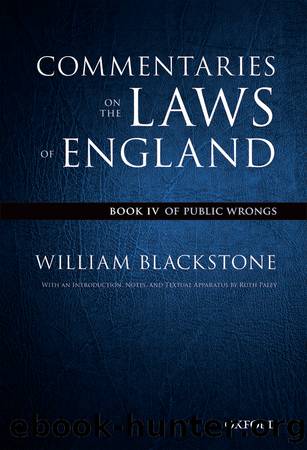The Oxford Edition of Blackstone's: Commentaries on the Laws of England by Blackstone William;Paley Ruth; & Ruth Paley

Author:Blackstone, William;Paley, Ruth; & Ruth Paley [Blackstone, William & Paley, Ruth]
Language: eng
Format: epub
Publisher: Oxford University Press, Incorporated
Published: 2016-08-02T00:00:00+00:00
A rule, to which all municipal laws, that are founded on the principles of justice, have strictly conformed: the Roman law requiring a citation at the least; and our own common law never suffering any fact (either civil or criminal) to be tried, till it has previously compelled an appearance by the party concerned. After this summons, the magistrate, in summary proceedings, may go on to examine one or more witnesses, as the statute may require, upon oath; and then make his conviction of the offender, in writing upon which he usually issues his warrant, either to apprehend the offender, in case corporal punishment is to be inflicted on him; or else to levy the penalty incurred, by distress and sale of his goods. This is, in general, the method of summary proceedings before a justice or justices of the peace: but for particulars we must have recourse to the several statutes, which create the offence, or inflict the punishment; and which usually chalk out the method by which offenders are to be convicted. Otherwise they fall of course under the general rule, and can only be convicted by indictment or information at the common law.
III. To this head, of summary proceedings, may also be properly referred the method, immemorially used by the superior courts of justice, of punishing contempts by attachment, and the subsequent proceedings thereon.
281282The contempts, that are thus punished, are either direct, which openly insult or resist the powers of the courts, or the persons of the judges who preside there; or else are consequential, which (without such gross insolence or direct opposition) plainly tend to create an universal disregard of their authority. The principal instances, of either sort, that have been usuallyâd â©2⪠punished by attachment, are chiefly of the following kinds. 1. Those committed by inferior judges and magistrates: by acting unjustly, oppressively, or irregularly, in administring those portions of justice which are intrusted to their distribution; or by disobeying the kingâs writs issuing out of the superior courts, by proceeding in a cause after it is put a stop to or removed by writ of prohibition, certiorari, error, supersedeas, and the like. For, as the kingâs superior courts (and especially the court of kingâs bench) have a general super-intendence over all inferior jurisdictions, any corrupt or iniquitous practices of subordinate judges are contempts of that super-intending authority, whose duty it is to keep them within the bounds of justice. 2. Those committed by sheriffs, bailiffs, gaolers, and other officers of the court: by abusing the process of the law, or deceiving the parties, by any acts of oppression, extortion, collusive behaviour, or culpable neglect of duty. 3. Those committed by attorneys and solicitors, who are also officers of the respective courts: by gross instances of fraud and corruption, injustice to their clients, or other dishonest practice. For the mal-practice of the officers reflects some dishonour on their employers: and, if frequent or unpunished, creates among the people a disgust against the courts themselves. 4.
Download
This site does not store any files on its server. We only index and link to content provided by other sites. Please contact the content providers to delete copyright contents if any and email us, we'll remove relevant links or contents immediately.
| Comparative | Conflict of Laws |
| Customary | Gender & the Law |
| Judicial System | Jurisprudence |
| Natural Law | Non-US Legal Systems |
| Science & Technology |
Future Crimes by Marc Goodman(3009)
American Kingpin by Nick Bilton(2984)
The Meaning of the Library by unknow(2074)
Inside the Middle East by Avi Melamed(1947)
On Tyranny by Timothy Snyder(1863)
Why Nations Fail: The Origins of Power, Prosperity, and Poverty by Daron Acemoglu & James Robinson(1791)
Living Silence in Burma by Christina Fink(1736)
Putin's Labyrinth(1662)
The Mastermind by Evan Ratliff(1598)
Think Like a Rocket Scientist by Ozan Varol(1399)
Law: A Very Short Introduction by Raymond Wacks(1388)
The Smartest Kids in the World by Amanda Ripley(1369)
Leadership by Doris Kearns Goodwin(1350)
The Rule of Law by Bingham Tom(1320)
A Dirty War by Anna Politkovskaya(1318)
It's Our Turn to Eat by Michela Wrong(1307)
Philosophy of law a very short introduction by Raymond Wacks(1301)
Social Media Law in a Nutshell by Ryan Garcia & Thaddeus A Hoffmeister(1252)
Civil Procedure (Aspen Casebooks) by Stephen C. Yeazell(1180)
